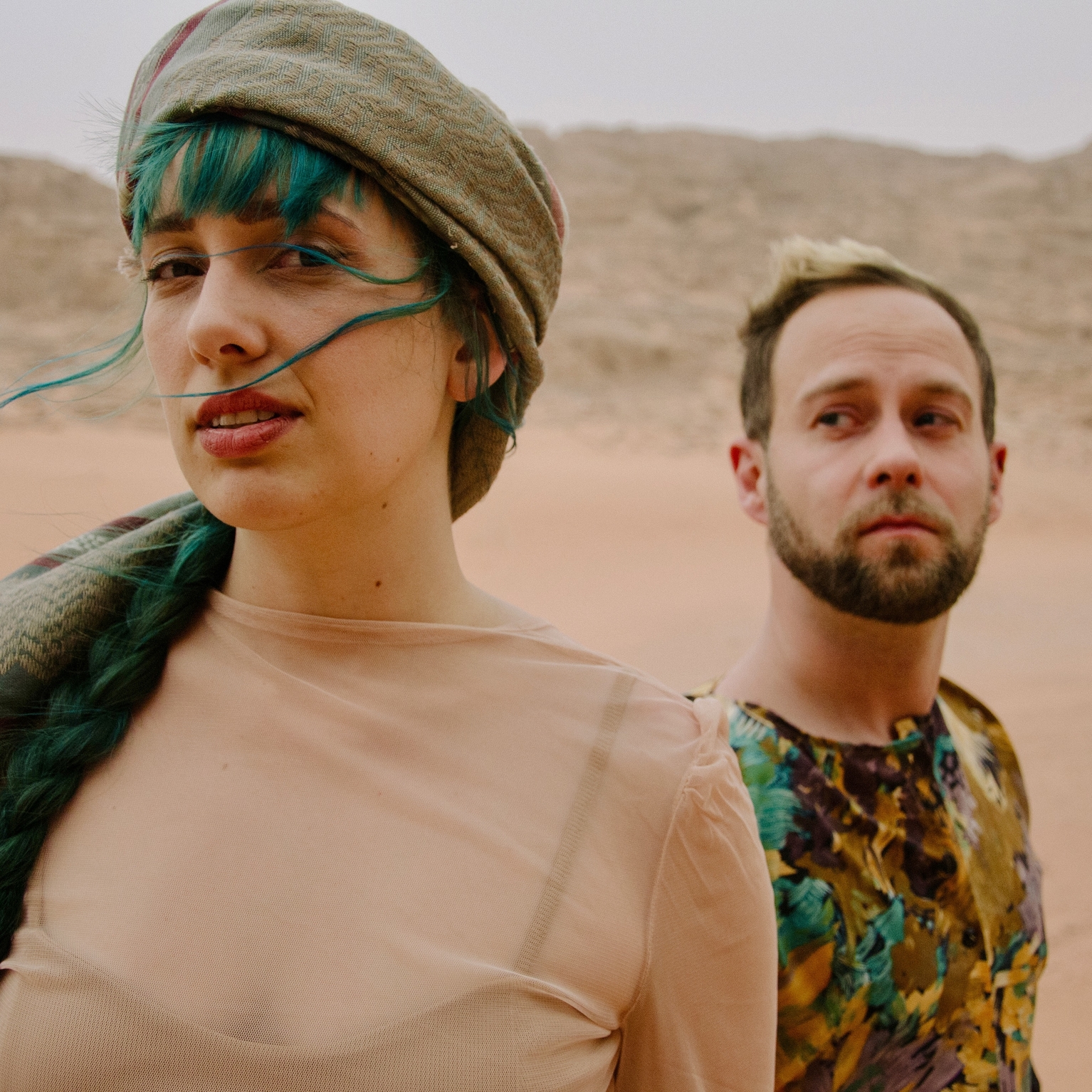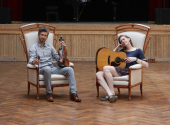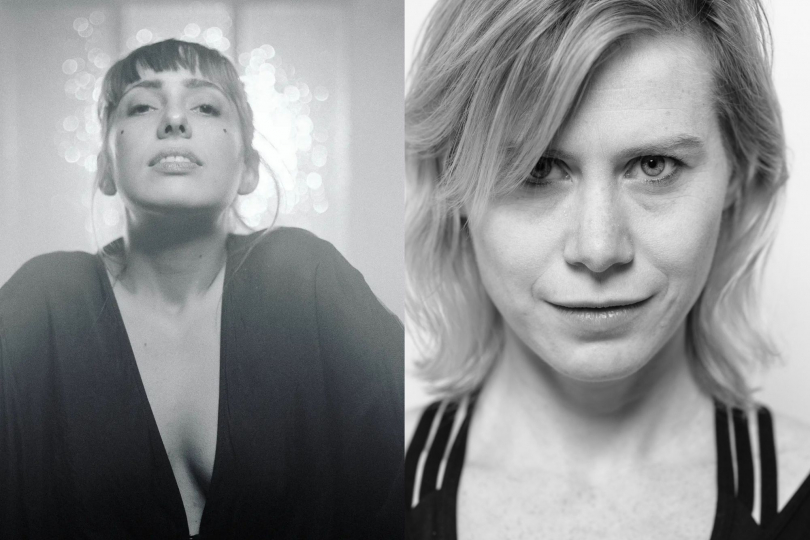
Two Songwriters, Two Cups of Coffee, and a Cat
They are both expats living in Prague, actively making music locally as well as internationally. They are both releasing a solo album: one of them with an acoustic and minimalist approach, the other making use of loopers, effects, and elaborate production. During the first wave of the pandemic, they kept their sanity by hosting an online open mic which was loved by musicians and fans alike. Loes (from the Netherlands) made use of all this “non-gigging time” by honing her skills on guitar and double bass, Marley Wildthing (from Austria) dove into sound and video editing. Though their approaches to songwriting and producing seem to be polar opposites, they have a mutual respect and are curious to pick the other’s brain. So they settled down on Marley’s couch on a Sunday afternoon with Marley’s cat Ishtar and two cups of coffee. Let’s talk songwriting!
Stick to the plan, man
Marley: How was it for you, making your album? Because you say you’re more acoustic-minded and I remember that at the very beginning, you said you wanted your album to really sound like you’re just one person, playing your songs as if you were in somebody’s living room with them. And then you said you added some layers with guest musicians after all… How do you know when it’s time to stop adding stuff because the song is done?
Loes: I was really lucky to have Ondra Kozák as my producer. He’s a multi-instrumentalist and he has a home studio where he does recording, mixing, and mastering. My reference album was Chameleon by Tim O’Brien: all songs on that album have only two layers: one guy, one voice, one instrument, nothing more. Ondra knows the album, so he understood exactly what it is that I was going for. The first step was to see if all the songs work with me and me only; if we felt that the song still needed something, then we’d discuss which instrument and how and where. If Ondra was capable of playing that (which he usually was), then he’d add it. On some occasions, I reached out to someone else, because it called for a specific instrument (like banjo, dobro, whistles, bouzouki) or for a player who has an affinity with a certain genre/style (like Irish trad). But once I start inviting guest musicians, I know so many talented ones that I never know when to stop. And that make me lose sight of the concept. During the pandemic, I was tempted to give up on the project so many times… And especially in the mixing phase, I was totally stuck. I couldn’t stand listening to myself, and I thought: “This is never going to be played on the radio,” because it seemed to me to be too simple and weak…
Marley: Who still gets played on the radio nowadays anyway?
Loes: Good point!
Loes: Anyway, for the mix we had a big debate: I wanted to add lots of layers to kind of bury or hide myself in, and Ondra said that in that case I’d better start over completely, because it would not fit the original concept of minimalism and intimacy. Then I realized we needed an outside ear, so I invited Honza Bartošek, who plays fiddle in my band, to come to the studio and give his opinion. We redid some vocal tracks, added Honza’s fiddle here and there, backing vocals only on two songs; and we even removed a few layers! For example, the bluegrass song "The Cactus Connection" felt unstable with just guitar and banjo. Any listener who’s into bluegrass would say “it needs bass and mandolin,” but a full bluegrass band would ruin the concept. So we added fiddle and removed the guitar, which usually functions as the “glue” in a bluegrass band. Without that glue, all of a sudden the song got a different vibe: just as if you’re sitting on a front porch and your friends are picking their instruments. So for me it was really important to have people close to me, whom I trust, that kept reminding me of the initial idea behind the album. Otherwise it’s just a collection of random songs and it would make more sense to release them as singles.
Marley: If you write songs in different styles, like you do—there’s a bluesy song, some country songs, some Irish folk stuff, some more poppy songs— then I think it’s clever to keep it simple, so that there’s a common thread. Something that’s just you.
Loes: I don’t know how much I want it to be about me per se. I see the album as a songwriting portfolio. When it comes to playing live, I prefer playing with a band, so I formed Lu’s & to accompany me at the release concert on 27 November. Ultimately, my dream is that a big artist like Alison Krauss hears the songs, records them, or would assign me to write new songs for them. Or… Marley Wildthing!
(They laugh)
Marley: But I think it works if the songs are naked, personal, emotional. And it is possible to take two approaches to the songs at the same time. Like Liane Le Havas, she’s a British singer-songwriter who brought out some albums with the fully produced versions, and then there’s just her acoustic solo versions afterwards. Which was actually very nice to listen to because she’s super gifted on her guitar, just by herself.
Gear with a story
Loes: To me it makes sense. I’m always a bit surprised when I see albums promoted as “singer-songwriter” that have this wall of sound, a full band and a lot of added effects, that confuses me because then I think; what’s the difference between this and a band playing original material? Is that just about their relationship to the band, that it’s not so much a band but more a bunch of individually hired session musicians? When I think “singer-songwriter,” I think of one person with one instrument. But I guess that’s a very old-fashioned, folky approach. That’s not even true for Bob Dylan anymore. And on the other hand, it does seem really cool to me, like an adventure, to go all the way, add lots of layers and really create a unique product, so that the audience gets a totally different experience when they go to a live show or when they listen to the album. I admire that about you, how you work with effects and how you have taught yourself to work with gear and sound software. I just assembled a basic pedal board with a delay, a looper, and a boost pedal, but I haven’t had the nerve yet to try it out on stage.
Marley: It takes a lot of time to figure out what you want. How to work with the effects. You always see these guitarists with huge pedal boards and it’s easy to think: I could do that too if I had all those pedals! But you have no idea how much time they spent at home tweaking and finding their own sound. It’s all about preparation.
Loes: How did your “gear journey” start for you, what was your first pedal?
Marley: I was once at a friend’s place with my ukulele and he had a grunge pedal. I thought it would be funny to have ukulele on a grunge pedal, so I bought one, but I never used it. Because in the end it turned out kind of stupid (laughs). I think the most important thing I ever bought is a looper. I started with a Boss RC-30, which is a little better than basic: you can record 2 separate loops, and it’s helped me so much. Both with songwriting and with gigging. Because otherwise, what can you do? You only have two hands for your instrument and you can sing, but you cannot really go beyond that.
I used to have a SPD::ONE kick stompbox as well, but then I figured out I can actually do everything with my looper. That helps me get more creative. I have a bigger looper now, the RC-300. And a couple of effects: a Boss DD-200 delay pedal, a Digitech Polara reverb pedal, and a Boss DD-3 delay pedal that I got from Justin Lavash, which I’m actually pretty proud of.
Loes: It’s always good to have gear with a story...! So that’s your set-up for live gigs now?
Marley: For live shows, I also use an Akai MPX8 sampler, which actually helps me a lot because it has a much better sound quality than if I just beat my instruments (laughs). And I can put little samples on there as well. That’s pretty much my setup, this, with ukulele and bass.
Loes: Do you put the samples on there beforehand, or do you make them on the spot?
Marley: Both. I’m also practicing on preparing bigger samples beforehand, which means I also need to work with a click, or at least I should if I want to be really precise. I can also put samples in my looper and play them directly from there if I program the tempo and everything beforehand. It’s basically its own computer, so you need to figure out what you need to set, because otherwise it might mess something up completely.
And I also want to start integrating an echo effect. Because especially with the bass guitar, I think an echo is really cool. It reminds me of The XX, that kind of sound.
Loes: Isn’t feedback always a big issue when playing with a looper? How do you set your monitors?
Marley: I just got a wireless in-ear system. I used it for the first time during the premiere concert of the "Wildflower" video in August with my band, and it was so nice. It’s so comfortable, you have everything you need right in your ear! You can take one out if you want to be more in touch with the audience or something, but it’s great—wherever you go, it’s always there. My setup is getting more and more complicated... but I like it!
The songwriting process: tricks, dry spells, and cheesy bridges
Loes: You said you use the looper in your songwriting process. Do you have a certain method or certain moments when you write?
Marley: I think it’s always different. I kind of like it that way. I write a lot. I write in books and that makes it easier. I don’t always have to make up lyrics on the spot, because sometimes I might have something already, which I wrote down in my notebook a while ago. Sometimes I have a melody, sometimes I check what melodies I had before. But it’s nice to have the looping thingy, just to repeat existing ideas and then try something over it and practice with it. Also, it teaches you to be more exact, because if you mess up a loop, it can get ugly. How is it for you?
Loes: Comes and goes... Sometimes I’m productive for a while, when I’m very introspective and I jot down everything that comes to mind, and then sometimes I’m more in a practical or strategic mode and I just organize and structure those ideas. For me, the book Songwriters on Songwriting by Paul Zollo was really helpful. It’s like the bible on songwriting, a big fat collection of interviews. Some songwriters would say: "I don’t know, it’s just, it comes from above and it happens when it happens..."
Marley: I’m kind of like this sometimes! Sorry!
Loes: But I respect that, it is a very personal process, songwriting. Some people have a trick or a game or a method and they can explain exactly how they do it, like Paul Simon for example. In the interview with Zollo, he says that sometimes he chooses a few words that are deliberately difficult and unusual, then he juxtaposes them with some really down-to-earth things that people will say in conversations in the store or on the street or when they’re thinking out loud to themselves, and then he gets back to it later and fills in the gaps. That’s why his lyrics seem to be poetic, direct, personal, and ambiguous all at once. I’ve also heard of songwriters who write a song, then cross out every other line to leave gaps in the story so the listener is free to interpret it in their own way. Those approaches are close to me. I usually start off with from something that happened to me personally or to a friend, and that would be the first verse. I take the abstract essence of that and turn it into a chorus. For the second verse and maybe third verse, I will take an entirely different angle to the same topic, something that removes it from me. I also really like writing songs from the perspective of another person, such as a grandmother or a child, or even a thing or an element of nature... I struggle the most with the bridge, though. My bridges are always cheesy.
Marley: I don’t know any of those tricks. I feel it can make songwriting more interesting, or when you get stuck, it gets you out of it. I haven’t had a “dry period” yet, I don’t know if you have those, but I’m always wondering and worrying: what if my creativity stops one day and I’m not gonna write anything anymore?
Loes: I think the dry periods are actually fine. Sometimes I get frustrated with myself: I should be creating! But then I remember that I’m doing 2 things at the moment: I’m starting up a band, which means rearranging my old material, and I’m working on promoting the solo album. Writing press releases in three languages that nobody will read and whatnot. And it bugs me if I haven’t touched my instrument for days on end because I’ve been stuck at the computer. But it wouldn’t be good for me if I would be distracted by new things right now, I have to stick with the old things for a while. Because maybe for me they’re old, but for the audience that doesn’t know me, they’re still new.
Marley: I have that too though. I’ve barely written anything in the past 2 years. I have friends that tell me that every week they wrote a new song. Sometimes you tend to compare yourself, like “I’m not creative anymore!” but it just depends on which phase of the process you’re in.
Loes: Come on, you recently finished an EP with Dušan, you finished a solo album and I heard you’re also releasing an EP with Kintsugi, you do sound for Avoid Sessions, you do music videos, you do promo... You’re the quintessential DIY musician who does everything herself! If you would also manage to write a song a day on top of that, you’d be Superwoman! But yeah, there are people who write a song every day and then they pick one every now and then and throw out the rest, or keep them in a drawer, like Stevie Wonder—and then either most of it will be shit, or even if all of it’s good, you can’t publish everything. Unless you’re Frank Zappa.
Marley: But it’s still a great practice, even to write shitty songs every now and then, why not?
Loes: I have trouble killing darlings. Or maybe I should say, it takes me a while to have a song become a darling... I usually don’t like what I’ve written at first. So I put it on a shelf and when I return to it later, I can sometimes completely transform it or use something, even if it’s just one sentence...
Marley: If I write complete bullshit ideas down, then I just eventually forget about them anyway.
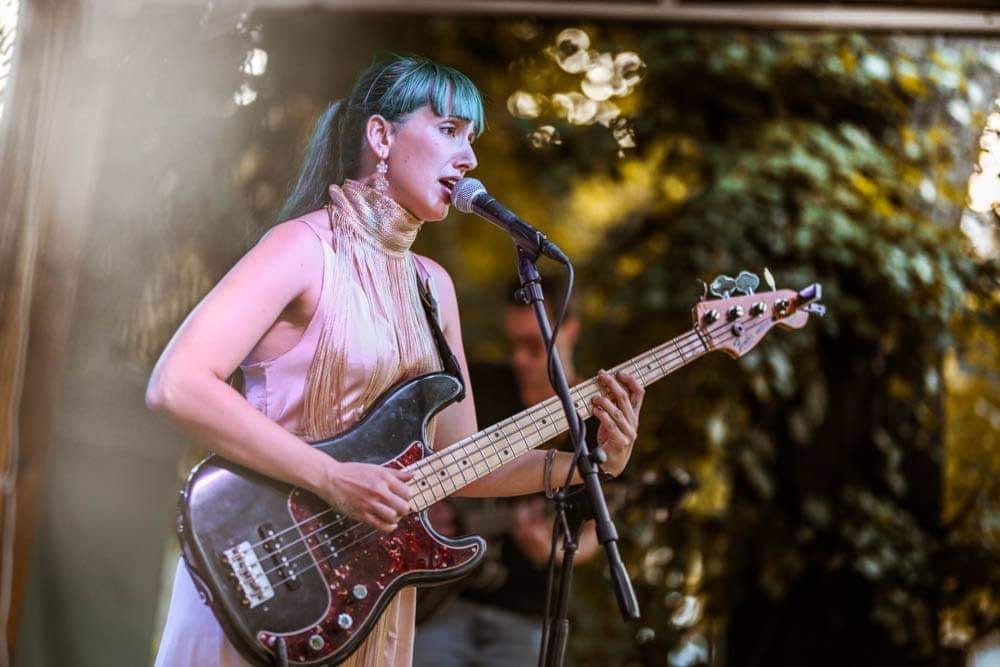
The pandemic and the silver lining
Loes: You’ve been really productive during the pandemic. What did it bring you?
Marley: During the first lockdown, I spent a lot of time at home with Dušan and we made the EP Wildflower together, which we're going to release in the spring of 2022. During the second lockdown, we each focused on our own projects, and I actually learned to produce my songs and make something more out of them than just acoustic songs. Not that acoustic is bad, but I wanted to learn how to work with Logic. Create something in a different way. For me this second lockdown was ideal, because I was in my little shell and I could spend entire days playing around with sounds. Otherwise, I wouldn’t have gotten into it so much. But like this it was kind of perfect timing.
Loes: There’s always a silver lining, isn’t there? So how about the solo album, when are you going to release it?
Marley: Actually, it’s the first time I finished something without a release date, without any pressure. Right now, I’m planning music videos and a touring schedule with my booking agent. I’m so glad I found her, because until now I’ve always done everything completely on my own, and it’s so nice to have someone to discus things with!
Your music and people: promotion
Loes: How did you find your booking agent?
Marley:Through a friend. For a long time, I was just sending masses of emails to random agencies, but that didn’t work at all. Then one day, a a friend gave me the contact to this agency. They came to one of my concerts and they liked it. So yay!
Loes: I think that “through a friend” is the only way to find the right match...
Marley: Yeah, I think so too. If you send random emails, it doesn’t matter if your material is great, but it’s just unlikely that they will take on a complete stranger. And I understand, it’s hard for the bookers to make a living, they can’t really afford to take just about anyone. They need to be very sure that they want to work with that person.
Loes: Do you know Derek Sivers?
Marley: No?
Loes: He is the founder of CD Baby, and now he writes these inspirational books mostly about how he made a fortune and everything. And he's proud to be weird. They’re very short articles that are fun to read, just snippets of recommendations and ideas that make you think about things differently, and you can pick and choose something that works for you. Right now, I’m reading Your Music and People, which is all about marketing. He writes that the music industry is overwhelmed by the daily flood of emails and already has enough of a challenge making a profit of the artists they have already signed. And that if you are going to send random emails, you need to be tenacious and willing to send three follow-up emails to show them your drive; but that the best “way in” is to have your music solicited through an existing contact, because it’s “pre-approved.”
Marley: Yeah. A lot of people told me about the power of namedropping. And I think that’s really the way. If you send an email and they’ve never heard your name, no one really cares. And also, sometimes you invest a lot of money into PR and you didn’t see any direct results like album sales or a huge turnout at a concert, and you might think it was for nothing, but I think that’s also important in the long run. If people hear your name over and over again, at some point they will see a concert announcement and they’re like: “Oh, I heard this name before! Maybe I’ll go check it out.” And I think this is how it works, you have to get out there again and again and again, even if sometimes you think it doesn’t make a difference—but it does.
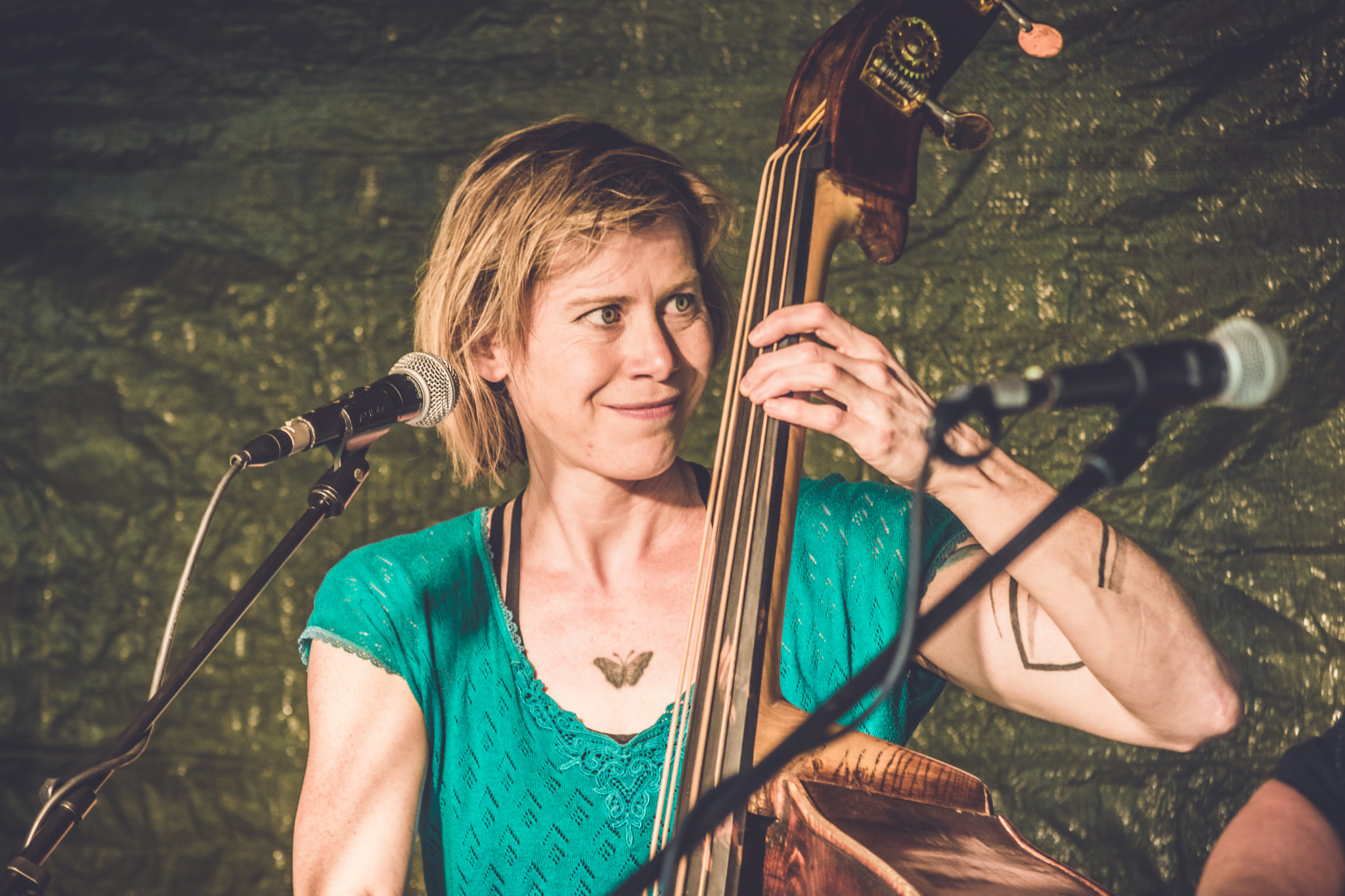
Loes: Are there any ways of promotion that you don’t use anymore, that you think are obsolete or that just don’t work for you? Like putting up posters, going around Prague with your bike and putting up posters everywhere?
Marley: I don’t think I ever did that! (laughs)
Loes: Or having an email newsletter…
Marley: I don’t know. What doesn’t work really is, like, Instagram stuff.
Loes: Really?? But your Instagram looks totally perfect! I actually use your social media as an inspiration…
Marley: Whoa, thank you!
Loes: So how come you feel like it’s not working?
Marley: I mean, to post something on social media every other day or whatever is not so much work and it’s a nice way to keep your fans engaged. But before, I tried to post really regularly and also have paid ads on Instagram, and that doesn’t really work. I don’t know why. Maybe it’s just not for me.
Loes: I don’t really understand how Instagram advertising works anyway. When I’m scrolling through my feed, I don’t even ever notice any ads. I guess I’ve trained myself to ignore them… On Facebook, the ads are more cleverly integrated into the feed, I think. But there also seems to be an issue with cookies right now. If I try to place an ad, I get a notification that many people in the EU are likely to opt out of cookies and might not see the ad.
Marley: What works for you, when it comes to promoting your concerts?
Loes: Hard to tell, I’m pretty new on the scene and as you said before, I also think it takes quite a bit of time to get your name out there. I’m a bit old-fashioned maybe in thinking that the best way to get noticed is to play a lot. Derek Sivers would not agree with me on that one by the way. Maybe it depends on the scene you’re in and how ambitious you are. If you want to be a rock or pop star, playing that’s never going to build up a large enough audience to attract the big labels' attention. But I’m in a niche, and my audience is on average a bit older, or they are young people with "old souls" (laughs). I was actually considering doing something really old-school and putting up posters again, like I did when I was in college. Even though it might be pointless, I kind of enjoyed going around the city on foot or by bike, having a chat with the bartenders, checking out the other posters and getting a feeling of what’s going on in the city, maybe trying out a nice coffee here and there…
Marley: That’s such an analogue way of advertising! (laughs)
Loes: I am analogue! (laughs)
Are you analogue? Are you digital? Are you a hybrid? Let us know about your approach to songwriting in the comments! Or write your very own article for our Community section and send it to info@insounder.org.
If you have found an error or typo in the article, please let us know by e-mail info@insounder.org.

